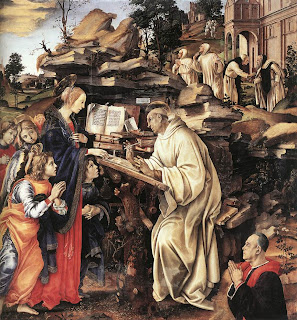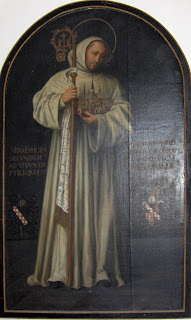
From a sermon by St. Bernard, abbot
I love because I love, I love that I may love
Love is sufficient of itself, it gives pleasure by itself and because of itself. It is its own merit, its own reward. Love looks for no cause outside itself, no effect beyond itself. Its profit lies in its practice. I love because I love, I love that I may love. Love is a great thing so long as it continually returns to its fountainhead, flows back to its source, always drawing from there the water which constantly replenishes it. Of all the movements, sensations and feelings of the soul, love is the only one in which the creature can respond to the Creator and make some sort of similar return however unequal though it be. For when God loves, all he desires is to be loved in return; the sole purpose of his love is to be loved, in the knowledge that those who love him are made happy by their love of him.The Bridegroom’s love, or rather the love which is the Bridegroom, asks in return nothing but faithful love. Let the beloved, then, love in return. Should not a bride love, and above all, Love’s bride? Could it be that Love not be loved?Rightly then does she give up all other feelings and give herself wholly to love alone; in giving love back, all she can do is to respond to love. And when she has poured out her whole being in love, what is that in comparison with the unceasing torrent of that original source? Clearly, lover and Love, soul and Word, bride and Bridegroom, creature and Creator do not flow with the same volume; one might as well equate a thirsty man with the fountain.
What then of the bride’s hope, her aching desire, her passionate love, her confident assurance? Is all this to wilt just because she cannot match stride for stride with her giant, any more than she can vie with honey for sweetness, rival the lamb for gentleness, show herself as white as the lily, burn as bright as the sun, be equal in love with him who is Love? No. It is true that the creature loves less because she is less. But if she loves with her whole being, nothing is lacking where everything is given. To love so ardently then is to share the marriage bond; she cannot love so much and not be totally loved, and it is in the perfect union of two hearts that complete and total marriage consists. Or are we to doubt that the soul is loved by the Word first and with a greater love?

Pope Benedict XVI: "On Saint Bernard of Clairvaux"
For him, love is the greatest force of the spiritual life. God, who is love, creates man out of love and out of love rescues him. The salvation of all human beings, mortally wounded by original sin and burdened with personal sins, consists in adhering firmly to divine charity, which was fully revealed to us in Christ crucified and risen.
In his love, God heals our will and sick intelligence, raising them to the highest level of union with him, namely, to holiness and mystical union.
[...]
It is necessary to pay attention to the dangers of excessive activity, regardless of one's condition and occupation, observes the saint, because -- as he said to the Pope of that time, and to all Popes and to all of us -- numerous occupations often lead to "hardness of heart," "they are no more than suffering for the spirit, loss of intelligence and dispersion of grace" (II, 3).
This admonition is valid for all kinds of occupations, including those inherent to the governance of the Church. The message that, in this connection, Bernard addresses to the Pontiff, who had been his disciple at Clairvaux, is provocative: "See where these accursed occupations can lead you, if you continue to lose yourself in them -- without leaving anything of yourself for yourself" (ibid).
How useful for us also is this call to the primacy of prayer! May St. Bernard, who was able to harmonize the monk's aspiration for solitude and the tranquility of the cloister with the urgency of important and complex missions in the service of the Church, help us to concretize it in our lives, in our circumstances and possibilities.
[...]
He [St. Bernard] wrote these famous words: "Whoever you are that perceive yourself during this mortal existence to be rather drifting in treacherous waters, at the mercy of the winds and the waves, than walking on firm ground, turn not away your eyes from the splendor of this guiding star, unless thou wish to be submerged by the storm. ... Look at the star, call upon Mary. ... With her for guide, you shall not go astray, while invoking her, you shall never lose heart ... if she walks before you, you shall not grow weary; if she shows you favor, you shall reach the goal," ("Homilia super Missus est," II, 17).
